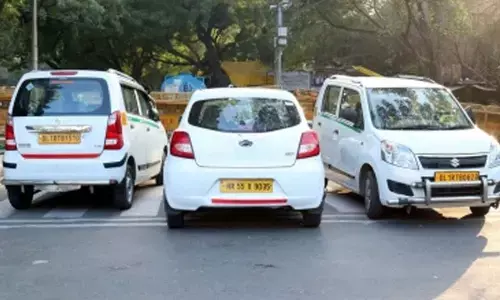Why farmers need urgent attention

Why farmers need urgent attention.While the rising number of farmer suicides is only a reflection of how fragile the agrarian economy is, the entire focus is on providing adequate relief and compensation to farmers who suffered crop losses.
Broken promises apart, a regular income for farmers is extremely essential
The real big bang in economic reforms would be when the government works out a minimum assured monthly income that a farming family must get. If a chaprasi in the government can get a minimum basic salary of Rs 15,000 per month, I see no reason why the farmers should be deprived of his legitimate due. As per the latest estimates of the National Sample Survey Organisation, a farmer family on an average earns only Rs 3,078 from farming operations.According to another survey, nearly 58 per cent of the farmers go to bed hungry
While the rising number of farmer suicides is only a reflection of how fragile the agrarian economy is, the entire focus is on providing adequate relief and compensation to farmers who suffered crop losses.
.jpg)
In this bargain, the real issues confronting farming are once again being sidelined. Once the rains are over, the relief distributed, and the nation’s attention shifts to how much the loss in crop production is and the resulting impact on food inflation, farmers will once again be forgotten. This has been the travesty of farming all these years, and it is primarily for the deliberate neglect and apathy that agriculture continues to bleed.
The intention is very clear. With the Centre conveying to the Supreme Court its inability in providing farmers with 50 per cent profit over the cost of cultivation, farmers are being left in the lurch. They are expected to fend for themselves, and face the vagaries of the markets once the government begins to withdraw the minimum support price (MSP) for wheat and paddy. Economic Survey 2015 has made this amply clear.
During campaign, Modi promised to enhance the Minimum Support Price (MSP) by 50 per cent if his party came into power. The government has simply backtracked on its promise. But soon after coming into power, the government raised the MSP for paddy and wheat by a paltry Rs 50 per quintal, which translates into an increase of 3.6 per cent, not enough to offset the additional burden of inflation at that time.
The farmers’ anger is quite justified. Despite being at the bottom of the pyramid, Indian farmers have not failed the nation. While they continue to produce a bumper harvest year after year, they are made to pay the price for keeping food prices low for consumers.
As per the latest estimates of the National Sample Survey Organisation (NSSO) a farmer family on an average earns only Rs 3,078 from farming operations. According to another survey, nearly 58 per cent of the farmers go to bed hungry. Another survey by Centre for the Study of Developing Societies (CSDS) shows that 62 per cent farmers want to quit agriculture.
Appearing before a Supreme Court bench of Justices SJ Mukhopadhaya and NV Ramana, the additional solicitor general Maninder Singh, however, said: “Prescribing an increase of at least 50 per cent on cost may distort the market.” A mechanical linkage between MSP and cost of production may be counter-productive in some cases.” In simple words, the government has expressed its inability to hike the MSP.
I find it amusing to know that providing a higher price to farmers will distort the markets. Considering that only 6 per cent India’s 60-crore farmers get the benefit of MSP, and the remaining 94 per cent are in any case dependent on the vagaries of markets, it shows the markets are only exploiting the farmers. If the markets had provided farmers with an economic price, I am sure 94 per cent of the farming community would have been a happy lot by now.
The question of an ‘income policy’ for farmers therefore assumes importance in the wake of the serial death dance that continues to be enacted on the farms. Over 3 lakh farmers have committed suicide in the past 17 years. Moreover, with the World Trade Organisation (WTO) breathing down the neck, and demanding freezing of MSP for farmers, it looks difficult whether the government will have the political courage to defy WTO.
The real big bang in economic reforms would therefore be when the government constitutes a National Farmers Income Commission that works out a minimum assured monthly income that a farming family must get. Incorporating crop harvest and also basing the calculations on the geographical location of the farm, the Commission should be directed to provide a real time estimate of the farm income for various categories of farmers. If a chaprasi in the government can get a minimum basic salary of Rs 15,000 per month, I see no reason why the farmers should be deprived of his legitimate due. (The author is a food policy expert. Courtesy: www.dnaindia.com)
By Devinder Sharma














